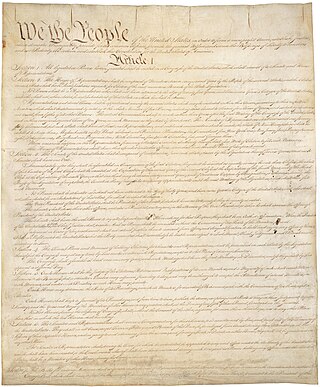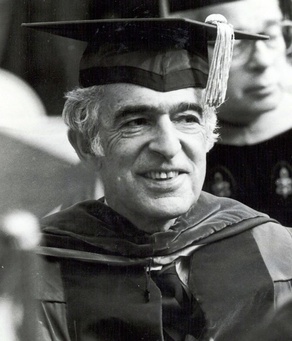Marbury v. Madison, 5 U.S. 137 (1803), was a landmark decision of the U.S. Supreme Court that established the principle of judicial review, meaning that American courts have the power to strike down laws and statutes they find to violate the Constitution of the United States. Decided in 1803, Marbury is regarded as the single most important decision in American constitutional law. It established that the U.S. Constitution is actual law, not just a statement of political principles and ideals. It also helped define the boundary between the constitutionally separate executive and judicial branches of the federal government.

Magna Carta Libertatum, commonly called Magna Carta or sometimes Magna Charta, is a royal charter of rights agreed to by King John of England at Runnymede, near Windsor, on 15 June 1215. First drafted by the Archbishop of Canterbury, Cardinal Stephen Langton, to make peace between the unpopular king and a group of rebel barons who demanded that the King confirm the Charter of Liberties, it promised the protection of church rights, protection for the barons from illegal imprisonment, access to swift and impartial justice, and limitations on feudal payments to the Crown, to be implemented through a council of 25 barons. Neither side stood by their commitments, and the charter was annulled by Pope Innocent III, leading to the First Barons' War.

The Constitution of the United States is the supreme law of the United States. It superseded the Articles of Confederation, the nation's first constitution, on March 4, 1789. Originally including seven articles, the Constitution delineates the frame of the federal government. The Constitution's first three articles embody the doctrine of the separation of powers, in which the federal government is divided into three branches: the legislative, consisting of the bicameral Congress ; the executive, consisting of the president and subordinate officers ; and the judicial, consisting of the Supreme Court and other federal courts. Article IV, Article V, and Article VI embody concepts of federalism, describing the rights and responsibilities of state governments, the states in relationship to the federal government, and the shared process of constitutional amendment. Article VII establishes the procedure subsequently used by the 13 states to ratify it. The Constitution of the United States is the oldest and longest-standing written and codified national constitution in force in the world.
Due process of law is application by the state of all legal rules and principles pertaining to a case so all legal rights that are owed to a person are respected. Due process balances the power of law of the land and protects the individual person from it. When a government harms a person without following the exact course of the law, this constitutes a due process violation, which offends the rule of law.

Thoroughgood "Thurgood" Marshall was an American civil rights lawyer and jurist who served as an associate justice of the Supreme Court of the United States from 1967 until 1991. He was the Supreme Court's first African-American justice. Prior to his judicial service, he was an attorney who fought for civil rights, leading the NAACP Legal Defense and Educational Fund. Marshall was a prominent figure in the movement to end racial segregation in American public schools. He won 29 of the 32 civil rights cases he argued before the Supreme Court, culminating in the Court's landmark 1954 decision in Brown v. Board of Education, which rejected the separate but equal doctrine and held segregation in public education to be unconstitutional. President Lyndon B. Johnson appointed Marshall to the Supreme Court in 1967. A staunch liberal, he frequently dissented as the Court became increasingly conservative.
Boynton v. Virginia, 364 U.S. 454 (1960), was a landmark decision of the US Supreme Court. The case overturned a judgment convicting an African American law student for trespassing by being in a restaurant in a bus terminal which was "whites only". It held that racial segregation in public transportation was illegal because such segregation violated the Interstate Commerce Act, which broadly forbade discrimination in interstate passenger transportation. It moreover held that bus transportation was sufficiently related to interstate commerce to allow the United States federal government to regulate it to forbid racial discrimination in the industry.

Charles Hamilton Houston was an American lawyer. He was the dean of Howard University Law School and NAACP first special counsel. A graduate of Amherst College and Harvard Law School, Houston played a significant role in dismantling Jim Crow laws, especially attacking segregation in schools and racial housing covenants. He earned the title "The Man Who Killed Jim Crow".
Peter H. Irons is an American political activist, civil rights attorney, legal scholar, and professor emeritus of political science. He has written many books on the U.S. Supreme Court and constitutional litigation.

James Harvie Wilkinson III is an American jurist who serves as a United States circuit judge on the United States Court of Appeals for the Fourth Circuit. His name has been raised at several junctures in the past as a possible nominee to the United States Supreme Court.

The Constitution of the Commonwealth of Virginia is the document that defines and limits the powers of the state government and the basic rights of the citizens of the Commonwealth of Virginia. Like all other state constitutions, it is supreme over Virginia's laws and acts of government, though it may be superseded by the United States Constitution and U.S. federal law as per the Supremacy Clause.

The University of Virginia School of Law is the law school of the University of Virginia, a public research university in Charlottesville, Virginia.
Paul Finkelman is an American legal historian. He is the author or editor of more than 50 books on American legal and constitutional history, slavery, general American history and baseball. In addition, he has authored more than 200 scholarly articles on these and many other subjects. From 2017 - 2022, Finkelman served as the President and Chancellor of Gratz College, Melrose Park, Pennsylvania.

David D. Cole is the National Legal Director of the American Civil Liberties Union (ACLU). Before joining the ACLU in July 2016, Cole was the Hon. George J. Mitchell Professor in Law and Public Policy at the Georgetown University Law Center from March 2014 through December 2016. He has published in various legal fields including constitutional law, national security, criminal justice, civil rights, and law and literature. Cole has litigated several significant First Amendment cases in the Supreme Court of the United States, as well a number of influential cases concerning civil rights and national security. He is also a legal correspondent to several mainstream media outlets and publications.
Rodney A. Smolla, is an American author, First Amendment scholar and lawyer. Since 2022, he has served as the president of the Vermont Law and Graduate School, and was the 11th president of Furman University from 2010 to 2013.
The phrase law of the land is a legal term, equivalent to the Latin lex terrae, or legem terrae in the accusative case. It refers to all of the laws in force within a country or region, including statute law and case-made law.
Bernard Herbert Siegan was a longtime law professor at the University of San Diego School of Law, libertarian legal theorist and a former federal judicial nominee to the United States Court of Appeals for the Ninth Circuit. The New York Times called Siegan's nomination "one of the most bitterly disputed judicial nominations of the Reagan Era."

John Marshall was an American statesman, lawyer, and Founding Father who served as the fourth chief justice of the United States from 1801 until his death in 1835. He remains the longest-serving chief justice and fourth-longest serving justice in the history of the U.S. Supreme Court, and he is widely regarded as one of the most influential justices ever to serve. Prior to joining the court, Marshall briefly served as both the U.S. secretary of state under President John Adams, and a representative, in the U.S. House of Representatives from Virginia, thereby making him one of the few Americans to have held a constitutional office in each of the three branches of the United States federal government.

Henry Julian Abraham was a German-born American scholar on the judiciary and constitutional law. He was James Hart Professor of Government Emeritus at the University of Virginia. He was the author of 13 books, most in multiple editions, and more than 100 articles on the U.S. Supreme Court, judicial appointments, judicial process, and civil rights and liberties.

The rule of law is a political and legal ideal that all people and institutions within a country, state, or community are accountable to the same laws, including lawmakers, government officials, and judges. It is sometimes stated simply as "no one is above the law" or "all are equal above the law". According to Encyclopædia Britannica, it is defined as "the mechanism, process, institution, practice, or norm that supports the equality of all citizens before the law, secures a nonarbitrary form of government, and more generally prevents the arbitrary use of power."
Randy James Holland was a justice of the Delaware Supreme Court. He was appointed to that office in 1986 and was the youngest person to serve on the Delaware Supreme Court. He retired from the Court in 2017. His seat was taken by Justice Gary Traynor.










